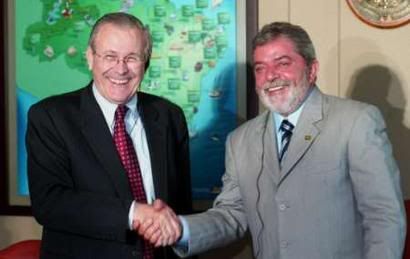Indeed, after the US-backed coup that overthrew the government of Jean-Bertrand Aristide in February 2004, Brasília and Buenos Aires sent in troops to "keep the peace in Haiti," i.e., to keep the "Haitian Intifada" in check.
Brazilian President Luiz Inacio Lula da Silva (R) shake hands with U.S. Defense Secretary Donald Rumsfeld before their meeting at Planato Palace in Brasilia, March 23, 2005. Rumsfeld is in Brazil for brief 24-hour official visit to discuss regional security and a law allowing Brazil's government to shoot down drug trafficking aircraft. (Jamil Bittar/Reuters)
U.S. Secretary of Defense Donald Rumsfeld (R) and his Argentine counterpart Jose Pampuro review an honor guard at the Ministry Defense building in Buenos Aires, March 22, 2005. Rumsfeld and Pampuro discussed the possibility of restarting combined military exercises, the radar network installation plan in the country's main airports and Argentina's role in the U.N. peacekeeping mission in Haiti. (Enrique Marcarian/Reuters)
Leftists in Brazil and Argentina naturally greeted Rumsfeld with protests:
U.N. Brazilian peacekeepers checks civilians as they surround a stronghold of ex-soldiers on the road in Terre Rouge, Haiti, Monday, March 21, 2005. (Ariana Cubillos/AP)
UN soldier from Argentina searches two men at a checkpoint in Gonaives. Two soldiers serving with UN forces in Haiti, one from Sri Lanka and one from Nepal, have been killed during separate security operations. (Thony Belizaire/AFP)
Mourners attend the funeral of three men, including two allegedly shot to death by police during a Feb. 28 protest to mark the first anniversary of ousted President Jean-Bertrand Aristide, in right poster, in Port-au-Prince, Haiti, Friday March. 18, 2005. The poster at center shows jailed former Prime Minister Yvon Neptune. (Rood Cherry/AP)
Supporters of the ousted President Jean-Bertrand Aristide march through the streets calling for his return and to mark the 18th anniversary of the ratification of Haiti's 1987 constitution in Bel-Air a slum in Port-au-Prince in Haiti,Tuesday, March,29, 2005.(Ariana Cubillos/AP)
Supporters of former Haitian President Jean-Bertrand Aristide yell 'Aristide or death' during a remonstration of several thousand of his supporters on March 29, 2005, the 18th anniversary of the country's constitution, in Port-au-Prince, Haiti, where the called for Aristide's return. (Daniel Morel/Reuters)
The record of MINUSTAH, the United Nations Stabilization Mission in Haiti, in light of human rights and international law is a disaster, unequivocally condemned in a new report co-authored by the Harvard Law Student Advocates for Human Rights and Centro de Justiça Global, a Brazilian human rights organization:
Effigies of US President George W. Bush (news - web sites), right, and Brazilian President Luiz Inacio Lula da Silva are seen during an anti-war protest in downtown Sao Paulo for the second anniversary of the U.S.-led invasion on Iraq (news - web sites), Brazil, Saturday, March 19, 2005. The banner on the left reeds 'Brazilian troops out of Haiti.' (Alexandre Meneghini/AP)
Left-wing militants and members of human rights organizations burn a US flag in protest at the arrival in Argentina of US Defense Secretary Donald Rumsfeld. Rumsfeld arrived to hold talks with his Argentine counterpart on the situation in troubled Haiti and Washington's concerns over shoulder fired missiles in Central America. (Pablo Cuarterolo/APF)
In the eight months since the U.N. peacekeeping troops disembarked in Haiti, . . . they have failed to uphold either the letter or the spirit of their mandate, as prescribed in Security Council Resolution 1542. Despite one of the strongest human rights mandates in the history of U.N. peacekeeping operations, MINUSTAH has not effectively investigated or reported human rights abuses; nor has it protected human rights advocates. Charged to train and reform the Haitian National Police, MINUSTAH instead has provided unquestioning support to police operations that have resulted in warrantless arrests and detentions, unintended civilian casualties and deliberate extrajudicial killings. (Harvard Law Student Advocates for Human Rights and Centro de Justiça Global, "Keeping the Peace in Haiti? An Assessment of the United Nations Stabilization Mission in Haiti Using Compliance with Its Prescribed Mandate as a Barometer for Success," March 2005, p. 48)What prompted Brasília to take the leading role in MINUSTAH? Brasília is motivated by its ambition to bid for a permanent seat on the United Nations Security Council, the bid that it believes is supported by Washington:
Brasília says recent US and French support for Japan's permanent membership on the Security Council was a promising sign for its own bid. "It means they are backing the 'group of four'," says a foreign ministry spokesman, referring to Japan, Germany, Brazil and India, who back each other's candidacies.At the same time, walking a "diplomatic tightrope," Lula has drawn a line: "Brazil’s President Lula Defends Venezuela’s Right to Sovereignty" (Venezuelanalysis.com 30 Mar. 2005). And so has Néstor Kirchner.
Brazil also believes backing Japan indicates the US and France support proposal "A" for adding six new permanent members and three non-permanent members to the Security Council. (Raymond Colitt, "Brazil Steps Up Drive for Seat on Security Council," Financial Times 29 Mar. 2005)
What is more important, in response to Washington's attempt to attack Venezuela through Colombia (using such means as the abduction of Rodrigo Granda), Brazil, as well as Spain, played the role of mediators: Humberto Márquez, "Politically Disparate Leaders Find Common Cause" (Inter Press Service 29 Mar. 2005); and Humberto Márquez, "New Four-Country Alliance Emerges at Summit" (Inter Press Service 29 Mar. 2005). Granted, multilateral regionalism is more beneficial to Brazilian and Spanish capitalists than Colombian and Venezuelan masses in the short term -- "While they helped bring about a diplomatic solution to the conflict, the left-wing governments in Brazil and Spain negotiated arms sales to both Colombia and Venezuela" (Márquez, "New Four-Country Alliance . . . ," 29 Mar. 2005) -- but that may be the price they must pay to keep Washington from sabotaging the political and economic integration of Latin America.













1 comment:
Amazing post, Yoshie.
Thanks.
Post a Comment